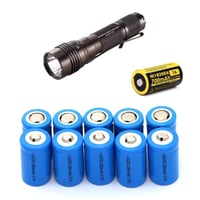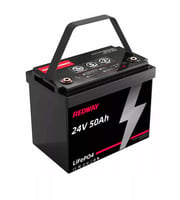In today's fast-paced world, the reliability of our gadgets is paramount. From smartphones to...
A Detail Comparison Of Gel Battery vs Lead-Acid Battery
Introduction:
When it comes to powering various applications, from automotive to renewable energy systems, choosing the right type of battery is crucial. Two popular options in the market are gel batteries and lead-acid batteries. Each comes with its own set of characteristics and benefits. In this comprehensive comparison, we'll delve into the intricacies of gel battery vs lead-acid battery, helping you make an informed decision for your specific requirements.

Understanding Gel Batteries:
Gel batteries, also known as gel cell batteries, belong to the family of valve-regulated lead-acid (VRLA) batteries. These batteries utilize a gelified electrolyte, which is immobilized within the battery's casing. This gel consistency ensures minimal leakage, even in case of battery damage or orientation changes. Gel batteries are renowned for their deep-cycle capabilities, making them ideal for applications requiring reliable and consistent power over extended periods.
Exploring Lead-Acid Batteries:
Lead-acid batteries are among the oldest and most widely used rechargeable battery types. They operate by utilizing lead dioxide and sponge lead as electrodes immersed in a sulfuric acid solution. Lead-acid batteries are available in various configurations, including flooded, absorbed glass mat (AGM), and gel. They are known for their affordability, robustness, and ability to deliver high surge currents, making them suitable for a wide range of applications, from automotive starting batteries to off-grid solar systems.
Comparing Performance:
Capacity and Efficiency:
Gel batteries typically offer lower capacity compared to lead-acid batteries but compensate with higher cycle life and deeper discharge capabilities. Lead-acid batteries, on the other hand, boast higher initial capacity but may suffer from reduced lifespan if subjected to frequent deep discharges.
Charging Characteristics:
Gel batteries exhibit slower charging rates compared to lead-acid batteries, requiring specialized charging algorithms to prevent overcharging and thermal runaway. Lead-acid batteries, especially AGM variants, can accept higher charge currents, enabling faster recharge times.
Maintenance Requirements:
Gel batteries are virtually maintenance-free, thanks to their sealed construction and gel electrolyte. In contrast, lead-acid batteries may require periodic maintenance, such as topping up electrolyte levels and equalization charging, to ensure optimal performance and longevity.
Environmental Considerations:
Safety and Environmental Impact:
Gel batteries are considered safer than flooded lead-acid batteries due to their spill-proof design and reduced risk of acid leakage. Additionally, gel batteries are more environmentally friendly, as they contain no free-flowing acid and can be disposed of with less environmental impact compared to traditional lead-acid batteries.
Recyclability:
Both gel batteries and lead-acid batteries are recyclable, with lead being the primary material of interest. Recycling programs for lead-acid batteries are well-established, contributing to the sustainability of battery technology and reducing the environmental burden of lead mining and production.
Cost Analysis:
Initial Investment vs. Total Cost of Ownership:
While gel batteries may entail a higher initial investment compared to lead-acid batteries, their longer service life and reduced maintenance requirements often result in lower total cost of ownership over the battery's lifespan. It's essential to weigh the upfront costs against long-term benefits when selecting the appropriate battery type for your application.
FAQs
-
Are gel batteries safer than lead-acid batteries?
Gel batteries are considered safer due to their spill-proof design and reduced risk of acid leakage. -
Can I use gel batteries as a direct replacement for lead-acid batteries?
Yes, gel batteries can often serve as drop-in replacements for lead-acid batteries in compatible applications. -
Do gel batteries require special charging equipment?
Gel batteries may require specialized charging algorithms to prevent overcharging and maximize lifespan. -
Are lead-acid batteries more affordable than gel batteries?
Lead-acid batteries typically have a lower upfront cost but may incur higher maintenance expenses over time. -
Which battery type is better for renewable energy systems?
Both gel batteries and lead-acid batteries are suitable for renewable energy applications, with the choice depending on specific requirements and budget considerations. -
How should I dispose of old gel or lead-acid batteries responsibly?
It's essential to recycle old batteries through authorized recycling centers to minimize environmental impact and comply with regulations.
Conclusion:
In conclusion, the choice between gel batteries and lead-acid batteries depends on various factors, including performance requirements, budget constraints, and environmental considerations. Gel batteries offer advantages in terms of safety, deep-cycle capabilities, and maintenance-free operation, while lead-acid batteries excel in affordability and high surge current applications. By understanding the nuances of each battery type, you can make an informed decision that aligns with your specific needs and preferences.


